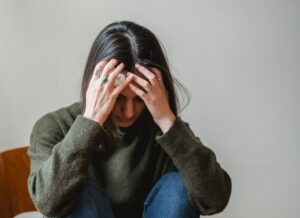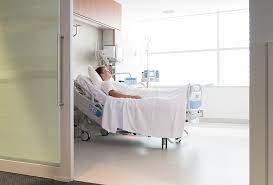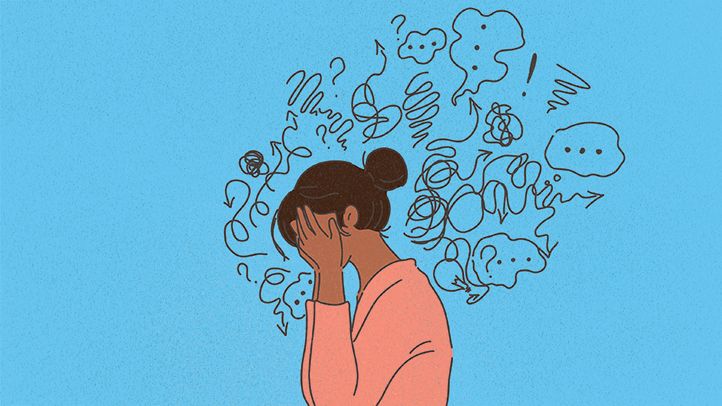Mental health is often viewed as a taboo topic, and it can be hard to talk about depression and anxiety openly. Many people feel like they are the only ones struggling, and that they should be able to just “snap out of it.” The truth is, mental health conditions are more common than you think. In this blog post, we will discuss the truth about mental health conditions, including symptoms, causes, and treatment options.
Contents
How Depression And Anxiety Are Connected?
 Depression and anxiety are two common mental health disorders that can have a profound effect on someone’s life. They are often comorbid, which means they occur together. In fact, according to the research, about 50 percent of people with one mental health disorder also have another.
Depression and anxiety are two common mental health disorders that can have a profound effect on someone’s life. They are often comorbid, which means they occur together. In fact, according to the research, about 50 percent of people with one mental health disorder also have another.
Depression is described as feeling persistently sad or low and can make someone lose interest in activities they once enjoyed. Anxiety, on the other hand, is characterized by feelings of worry, nervousness, and fear. These feelings can be so intense that they interfere with daily life.
There are several ways in which depression and anxiety are connected. For one, they share some common symptoms. For example, both can cause feelings of restlessness and fatigue. They can also both lead to sleep problems.
Another way that depression and anxiety are connected is that they often have the same triggers. Stressful life events, such as a death or divorce, can trigger both disorders. Genetics may also play a role, as mental health disorders tend to run in families.
Researchers have also found the link between depression and anxiety may be due to changes in the brain. Studies have shown that people with depression and anxiety tend to have differences in certain areas of the brain, such as the hippocampus, which is responsible for learning and memory. Similarly, there may also be differences in the way the brain processes neurotransmitters, such as serotonin.
So whatever the cause, it’s important to remember that depression and anxiety are both real and serious mental health disorders. If you or someone you know is struggling, there is help available. Talk to your doctor or a mental health professional about treatment options.
What Are The Signs Of Depression And Anxiety?
There are a few key signs to look for if you think someone you know may be struggling with depression and anxiety. First, pay attention to their mood.
- Are they consistently sad or down?
- Do they seem irritable or easily angered?
Next, notice any changes in their behavior.
- Have they withdrawn from friends or activities they used to enjoy?
- Are they using more alcohol or drugs?
Lastly, observe their physical health.
- Are they eating less or more than usual?
- Sleeping too much or too little?
- Losing or gaining weight?
Some common signs simply mean that a person is going through a tough time and do not necessarily indicate a mental health disorder. However, if you notice several of the above signs lasting for more than two weeks, it could be time to seek professional help. Depression and anxiety are common mental health disorders that can have debilitating effects on those who suffer from them.
Therefore, you should never hesitate to reach out for help if you are struggling. There are many resources available to you, and treatment can make a world of difference. If you or someone you know is struggling with depression or anxiety, please do not hesitate to reach out for help.
Is Anxiety Considered A Form Of Depression?
 People usually think that anxiety and depression are two different things. But in reality, they’re quite similar. Both conditions are caused by a chemical imbalance in the brain. And both can be treated with medication and therapy.
People usually think that anxiety and depression are two different things. But in reality, they’re quite similar. Both conditions are caused by a chemical imbalance in the brain. And both can be treated with medication and therapy.
However, anxiety is not considered a form of depression. This is because anxiety is more about worry and fear. Depression, on the other hand, is more about sadness and hopelessness. So, what’s the difference between anxiety and depression?
Well, anxiety is more of a mental condition than a physical one. It’s characterized by excessive worry and fear. And it can be triggered by stressful events or situations. Depression, on the other hand, is more of a physical condition. It’s characterized by sadness and hopelessness. And it can be caused by a chemical imbalance in the brain.
Anxiety can also lead to physical symptoms such as a racing heart, sweating, and trembling. Depression, on the other hand, can lead to fatigue, weight loss or gain, and insomnia. So, if you’re experiencing any of these symptoms, it’s important to see a doctor.
Both anxiety and depression are treatable conditions. And remember before you get the treatment you must get an accurate diagnosis for your condition. This is because the treatment for anxiety is different from the treatment for depression. So, if you think you might be suffering from either of these conditions, don’t hesitate to seek help from a professional.
How To Diagnose It?
The diagnosis of depression and anxiety can be made by a mental health professional, such as a psychiatrist, psychologist, or clinical social worker. A physical examination and laboratory tests may also be done to rule out other medical conditions.
The Diagnostic and Statistical Manual of Mental Disorders (DSM-IV) is the standard classification of mental disorders used by mental health professionals in the United States. It includes criteria for diagnosing depression and anxiety disorders.
The DSM-V criteria to diagnose depression and anxiety include some criteria and methods that are controversial and not well-validated. The most controversial is the requirement that the symptoms must cause “clinically significant distress or impairment in social, occupational, or other important areas of functioning.”
This means that a person who is depressed or anxious but does not feel distressed or impaired may not be diagnosed with a mental disorder. For example, if a person experiences anxiety about going to work but goes to work anyway, they would not be diagnosed with an anxiety disorder.
So, an accurate diagnosis can make a huge difference in whether a person will be able to get treatment or not. If you think you may have depression or anxiety, it is important to see a mental health professional for an evaluation.
How To Manage Depression And Anxiety?
 If your or someone you know is struggling with depression and anxiety, it’s important to understand that there are ways to manage these conditions. Several tips can help you manage both conditions. These include:
If your or someone you know is struggling with depression and anxiety, it’s important to understand that there are ways to manage these conditions. Several tips can help you manage both conditions. These include:
Identifying and avoiding triggers
This is one of the most important things you can do to manage your depression and anxiety. Triggers are the people, places, things, or situations that make your symptoms worse. Once you know what your triggers are, you can try to avoid them. For example, if work is a trigger for your anxiety, you might try to take some time off or speak to your boss about changing your job duties. Moreover, you can also work on building up your resilience. This means making changes in your life that help you better cope with stress.
Staying connected to supportive people
Depression and anxiety can make it difficult to stay connected to supportive people. It can be hard to reach out and ask for help, but it’s important to remember that you are not alone. Talk to your friends and family about how you’re feeling, and let them know what they can do to support you. There are also many online support groups available if you’re feeling isolated. Reaching out for help is a sign of strength, not weakness. It takes courage to face your mental health challenges.
Practicing relaxation techniques
Relaxation techniques are a great way to help ease the symptoms of both depression and anxiety. There are many different techniques that you can try, so it may take some trial and error to find the one that works best for you. Some common relaxation techniques include deep breathing, progressive muscle relaxation, and guided imagery.
Exercising regularly
Exercises are always a good way to improve your mood and mental state. It has been scientifically proven that people who exercise regularly are less likely to suffer from depression and anxiety. There are many different ways to exercise, so find one that suits you best and make it a part of your daily routine.
Eating a healthy diet
 A healthy diet is essential for good mental health. Eating nutritious foods helps the brain to function properly and can help to improve mood and reduce anxiety and depression. There are a few specific nutrients that are particularly important for mental health, including omega-three fatty acids, vitamin D, magnesium, and zinc. More often than not, people who are suffering from depression or anxiety are not getting enough of these essential nutrients.
A healthy diet is essential for good mental health. Eating nutritious foods helps the brain to function properly and can help to improve mood and reduce anxiety and depression. There are a few specific nutrients that are particularly important for mental health, including omega-three fatty acids, vitamin D, magnesium, and zinc. More often than not, people who are suffering from depression or anxiety are not getting enough of these essential nutrients.
Depression and anxiety can be tough to manage, but by following these tips, you can help make the process easier. As these tips will help your overall health, following them will also help improve your mental health. But you don’t have to do it alone; there is help available if you need it. If you or someone you know is struggling with mental health, please reach out for support.
Professional Treatment Options
Sometimes, self-help and therapy just aren’t enough. If you find yourself struggling to manage your depression and anxiety, it may be time to seek professional help. There are a variety of professional treatment options available, so you can find the one that best suits your needs.
Common professional treatment options for depression and anxiety include:
Counseling or therapy
This is often the first line of treatment for mental health conditions. Talking to a therapist can help you understand and work through your condition. They use different techniques to help you, depending on your needs. Moreover, it is important to find a therapist that you trust and feel comfortable talking to.
Moreover, there are several types and techniques of therapy, so you may need to try a few before finding the right fit. Some common types of therapy used to treat depression and anxiety include:
- Cognitive-behavioral therapy (CBT): This type of therapy helps you understand how your thoughts, feelings, and behaviors are connected. It can also help you learn new coping skills.
- Interpersonal therapy (IPT): This type of therapy focuses on your relationships with others and how they may be affecting your depression or anxiety.
- Mindfulness-based cognitive therapy: This type of therapy combines CBT with mindfulness techniques. Mindfulness can help you become more aware of your thoughts and feelings, which can help you manage them more healthily.
Medication
In some cases, medication may be necessary to manage your depression or anxiety. Medication can be used on its own or in combination with therapy. If you decide to try medication, it’s important to work with a mental health professional to find the right medication and dosage for you.
There are two types of medications commonly used to treat depression and anxiety:
- Antidepressants are the most common type of medication used to treat depression. They can take several weeks to start working.
- Anti-anxiety medications are typically used to treat anxiety disorders. These medications can help reduce symptoms of anxiety, but they may cause drowsiness and other side effects.
It’s important to remember that medication is not a “cure” for depression or anxiety. Medication can help reduce symptoms, but it’s often only one part of a larger treatment plan. In combination with therapy and other self-care strategies, though, medication can be an effective treatment for depression and anxiety.
Hospitalization
 In severe cases, people with depression may need to be hospitalized. This is usually done when someone is a danger to themselves or others, and can’t take care of themselves. Hospitalization provides a safe environment and around-the-clock care.
In severe cases, people with depression may need to be hospitalized. This is usually done when someone is a danger to themselves or others, and can’t take care of themselves. Hospitalization provides a safe environment and around-the-clock care.
Most people who are hospitalized for depression improve with treatment. But about one in three people with depression will have another episode of depression within a year after they leave the hospital. Therefore it is important to follow up with your mental health professional after you leave the hospital.
If you have depression and anxiety, you may feel like you will never get better. But most people with it improve with treatment. If you have any thoughts of harming yourself, please get help right away by calling a suicide hotline in your area.
It is important to remember that depression and anxiety are real medical conditions that can be treated. Be sure to talk to your doctor or mental health professional about all of your options. They can help you make the best decision for your unique situation.
Conclusion
To conclude, depression and anxiety are mental health disorders that can be treated. Both are difficult and the process is different for everyone, but it is possible to get better. You must understand and acknowledge your disorder to start the journey to recovery. Otherwise, it will be very difficult, if not impossible, to improve.
Both illnesses are often misunderstood because people do not see them as real diseases. This is primarily because mental health is an invisible disability. It is hard for others to understand what it feels like to be depressed or anxious when they have never experienced it themselves. This can make seeking help and treatment very difficult.
If you are struggling with depression or anxiety, please know that you are not alone. And for more information and tips you can contact Therapy Mantra. We have a team of professional therapists who can provide you with the support and guidance you need to recover from this condition. Contact us today to learn more about our services. You can also book an online counseling and therapy session or download our free Android or iOS app.


